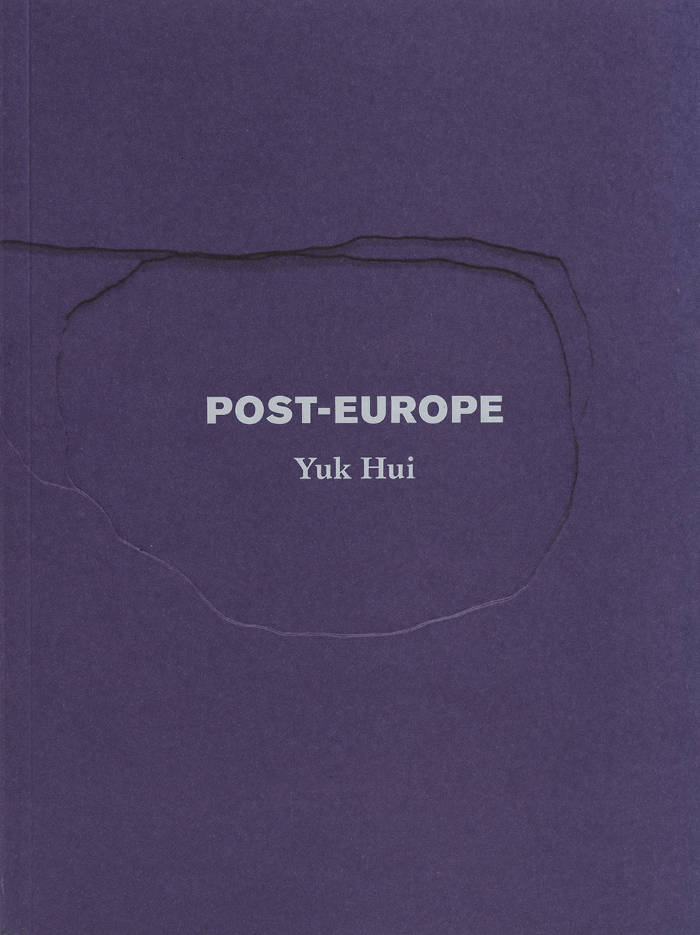Yuk Hui
Yuk Hui

Post-Europe
Today, we increasingly live in a state of becoming-homeless, while our homelessness also produces a desire for some form of homecoming, as is evident in the rise of conservative and neoreactionary movements worldwide.
With the unstoppable advance of global capitalism, the Heimatlosigkeit (homelessness) which twentieth-century European philosophers spoke of, and which Heidegger declared had become the ‘destiny of the world’, is set to become ever more pathological in its consequences. But rather than dreaming of an impossible return to Heimat, Yuk Hui argues that today thinking must start out from the standpoint of becoming-homeless—which also implies thinking a Post-Europe condition.
Europe may now be only one region among others, but to imagine that its decline simply marks a shifting of the locus of ‘world history’ to the East is to remain within the sphere of European techno-logocentrism. The planetary spread of technology may have released modern science and technology from being exclusively European assets, but it has also propagated a set of cognitive models that bar us from thinking otherwise, and put in place a global axis of time through which European modernity becomes the synchronising metric of all civilisations.
Following Novalis’s suggestion that philosophy is a form of homesickness, Jacques Derrida’s claim that philosophy is intrinsically European, and Bernard Stiegler’s insistence that philosophy’s logos is inextricable from the techne of technology, in Post-Europe Yuk Hui envisions a project of a post-European thinking. If Asia and Europe are to devise new modes of confronting capitalism, technology, and planetarisation, this must take place neither through a neutralisation of differences nor a return to tradition, but through a new individuation of thinking between East and West.
Drawing on the philosophies of Gilbert Simondon, Jacques Derrida, Bernard Stiegler, and Jan Patočka alongside the thought of Kitaro Nishida, Keiji Nishitani, Yoshimi Takeuchi, and Mou Zongsan among others, this examination of the relation between philosophy, technology, and the decline of European hegemony is also a reflection on the author’s own trajectory as a wanderer and an immigrant, and the complicit relation established between corporeal memory, linguistic plasticity, and Heimat via the tongue, that most neglected of technical organs.
Yuk Hui is the author of several titles including On the Existence of Digital Objects (University of Minnesota Press, 2016), The Question Concerning Technology in China: An Essay in Cosmotechnics (Urbanomic, 2016), Recursivity and Contingency (Rowman & Littlefield, 2019), Art and Cosmotechnics (e-flux/University of Minnesota Press, 2021), and Machine and Sovereignty: For a Planetary Thinking (University of Minnesota Press, 2024). He is currently Professor of Philosophy at Erasmus University Rotterdam.
And more

Theater, Garden, Bestiary – A Materialist History of Exhibitions
Vincent Normand, Tristan Garcia
This volume both gathers and expands on the results of the research project “Theater, Garden, Bestiary: A Materialist History of Exhibitions” held at ECAL/University of Art and Design Lausanne, and proposes to draft a history of exhibitions sourced from a wide corpus reaching beyond the framework of art institutions. It undertakes a transdisciplinary history, at the nexus of art history, science studies, and philosophy, exploring the role the exhibition played in the construction of the conceptual categories of modernity, and outlines a historiographical model that grasps the exhibition as both an aesthetic and epistemic site.
Contributions by Etienne Chambaud, Elitza Dulguerova, Anselm Franke, Tristan Garcia, Fabien Giraud & Raphaël Siboni, Dorothea von Hantelmann, Yuk Hui, Pierre Huyghe, Sami Khatib, Jeremy Lecomte, Stéphane Lojkine, Rafael Mandressi, Vincent Normand, Peter Osborne, Filipa Ramos, Juliane Rebentisch, João Ribas, Pamela Rosenkranz, Anna-Sophie Springer, Lucy Steeds, Olivier Surel, Etienne Turpin, Kim West, Charles Wolfe.